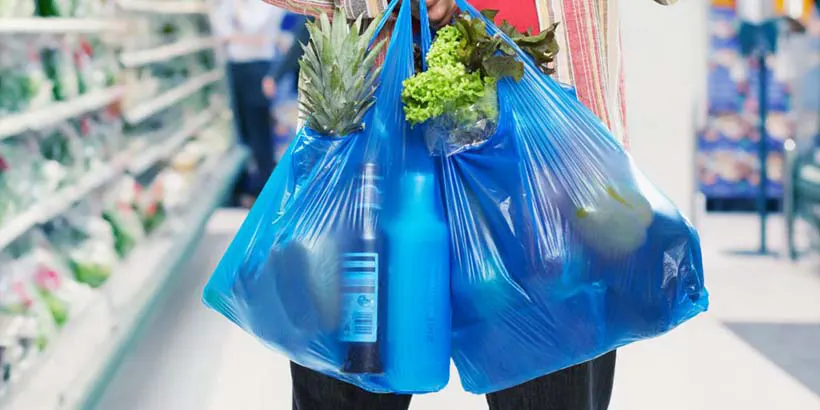Most Effective Methods to Reduce Disposable Plastic Bag Use

University of New Hampshire Study Answers the Question of How to Reduce Plastic Bag Use
Disposable plastic bags have become so commonplace we almost miss them rolling by us tossed through the wind like tumbleweeds. These thin-film bags are lightweight and make it so easy to carry groceries and other goods but they are no friend to the environment, wildlife or our food-chain. The advantages of disposable plastic bags are no match for the disadvantages. From using up nonrenewable resources, to posing a threat to the planet and wildlife, single-use plastic bags are more of a nuisance than a help. For these reasons laws regulating disposable plastic bags, either through bans or fees, are on the rise. When it comes to combating the negative impacts and effective methods to reduce consumer use of single-use plastic bags, a new study shows that bag bans and fees are the answer.
University of New Hampshire Study Determines Most Effective Methods to Reduce Use of Disposable Plastic Bags
Bag fees are proven effective when the amount of the fee is high enough to dissuade shoppers from paying the fee. When shoppers feel it in their wallet, they go reusable. Consumers would rather bring their own reusable grocery bags, instead of paying the bag fee which makes achieving the goal of reducing the use of disposable plastic bags achievable.
The University of New Hampshire analyzed a variety of policies aimed at reducing or eliminating the use of single-use plastic bags to determine the impact. Per the research, “If the goal is to get rid of plastic bags completely from the environment, a ban works the best. A take-back/recycling program needs to be accompanied with an education program to make it a habit for consumers.”
Are Laws Regulating Disposable Plastic Bags Necessary?
Not everyone agrees with laws banning or levying fees on single-use plastic bags; and when such a measure is suggested it is commonly met with resistance to some degree. Oftentimes critics look for alternatives to a bag ban or bag fee that will still reduce consumer use of plastic bags.
The most common alternative solution offered is increased efforts around recycling. Single-use plastic bags are primarily a problem after they have fulfilled their intended purpose. Plastic does not belong in landfills, because it does not safely break down and stays in our environment. When plastic is discarded as litter in landfills, we still have the same issue of it not safely breaking down, but it can also present a danger to animals who may become tangled in or ingest the plastic.
Recycling resolves a lot of these problems by repurposing the plastic into useful bags; however, recycling rates continue to lag. Not all recycling facilities accept thin film plastic, and there is not an effective method of getting disposable plastic bags from consumers to recycling facilities with the capability to handle them. Bag bans and fees targeting single-use plastic bags work, while recycling is just not a viable solution when the goal is to reduce consumer use of plastic bags.
Follow the Bag Ban Movement with Our Map
Want to learn more about places that have figured out how to reduce consumer use of disposable plastic bags? We have an interactive plastic bag ban map that tells the story of not only bag bans, but also bag fees throughout the United States and the world.
We also support the cities working to make the planet a greener place by recognizing the Top Green Cities in the USA! If you know of a city that should be this list please let us know and we’ll make sure they get the credit they’re due. If you represent any of these cities, or if you want to show some hometown pride, please grab the link for the badge to display on your site or blog.
Tagged




